16 Things I’ve Learned About Early Motherhood
Because I'm too tired to come up with a round number

My daughter Mitra recently turned 9 months old, out in the big wide world for the same amount of time that I carried her. As she babbles incoherently, cruises around furniture, joyfully devours the meals I cook, and tears up and eats any newspaper and magazine in sight, I’ve also been able to return to some elements of my previous life. I’m back to working again, which has been invigorating; enjoying nights out with friends, which has been enchanting; and I’ve finally found the time to cook meals that take longer than 20 minutes to prepare, which has been rewarding for my family but bad for the tech companies who have been delivering most of our takeaways.
Like all new parents, the impact of the last 9 months has been profound, and I’m still finding my feet. Nothing can prepare you for the complete overhaul of your life when you have your first baby, no matter how many books you read or friends you talk to. So here are a few things I’ve learned about early motherhood…
1. You will cherish the meals that people bring you
In those hazy early weeks, when days and nights blur together, the comfort that came from eating lovingly prepared food cooked by friends and family will stay with me forever. The sweet rhubarb crumble that I ate hovering over a breast pump. The vegetable lasagna I cut into pieces and scooped up one-handed with a spoon while breastfeeding. The huge moussaka that we divided into portions to save us for future meals. Special bonus points to the people who said they didn’t even want to come in but would leave food at the door. THEY REALLY GOT IT. If your friend is having a baby, spend part of the baby shower setting up a meal train for people to bring them food. They’ll thank you for it later.
2. The newborn phase can be torturous. It’s OK not to enjoy it.
Much of how your experience of early motherhood goes depends on your birth, the temperament of your baby, and what social support you have around you. It was hellish for us, and I shudder every time I think about it. I internally screamed every time someone told me to “enjoy this special time, it goes so quick,” when I felt like I was in pure survival mode, living through a nightmare of my own choosing. Part of this was bad luck—I had a traumatic birth with medical negligence, an emergency C-section, and post-surgery complications (thanks, NHS!). I was shell-shocked for days, unable to even pick up my phone to text my best friends to tell them I’d had my baby until five days after she was born. It took A LONG time to find my feet after this, especially in the chaos of sleep deprivation, a baby who wasn’t gaining weight, struggles with breastfeeding, and postpartum hormone crashes. Not everyone enjoys the early stage, and that’s OK. I love hanging out with Mitra now; she’s so much fun and her smile lights me up. The early months? Not so much.
3. Speaking of birth. No one cares about your “birth plan”
Including you, when you are screaming for an epidural.
4. You will never sweat so much, stink so bad, or feel as cold as you do postpartum.
The myriad of postpartum symptoms are a joke. In the weeks after Mitra was born I’d wake up drenched in sweat (through my clothes, through my bedsheets), and the smell that emanated from my body was an abomination. I would wash my armpits several times a day, but it would still be there, like the remnants of a decaying dead animal—a putrid mixture of sweat, blood, milk, and hormones. Then, in the early hours of the morning, the cold shivers would come. It was warm late spring, but as I’d get into bed after a night feed, a deep internal freeze would come over me. I’d lie there shivering under layers of clothes, with jumpers and hoodies thrown over me, not quite understanding how my body could have such a vitriolic reaction to hormones leaving my body. Fuck you, hormones.
5. Looking after a small baby can be really boring.
Man, I was bored. I read a lot, which was good. But it kinda felt like being in the pandemic again. Stuck at home on my own with no one to talk to, going through the monotony of the same routine every day. Mitra has pretty much always hated the pram, so walks longer than 20 minutes (unless you want to deal with a screaming baby) were out of the question. The baby groups killed an hour a day, but then what? I felt like my brain was melting. The 2-hour daytime contact naps were great, though. I re-watched all six seasons of The Sopranos, and that was amazing.
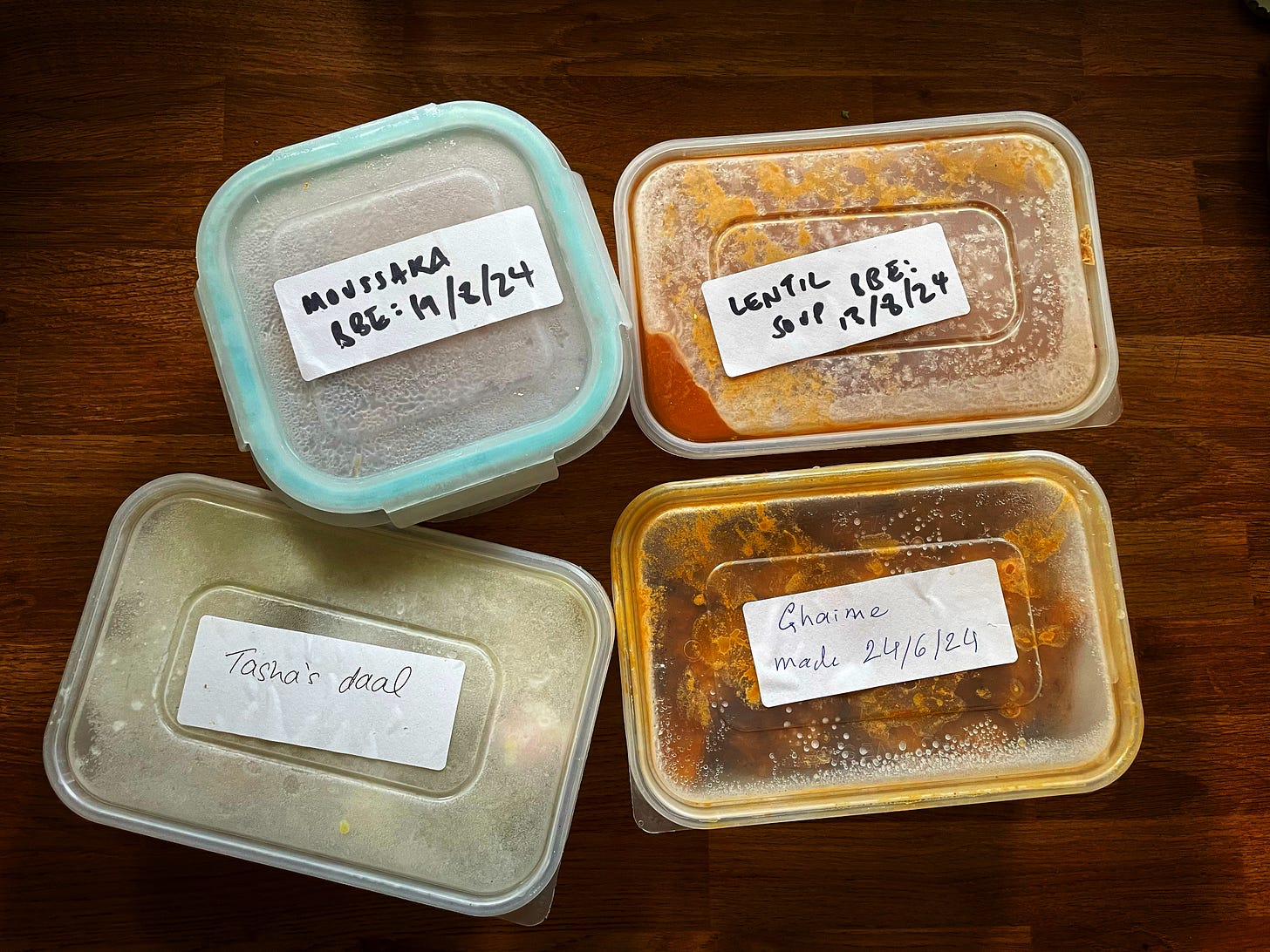
6. Your relationship as you know it is over.
You hear this often, but I smugly felt like it wouldn’t happen to us. Who was I kidding? At best, my partner and I were like two very efficient and busy co-workers who left each other uplifting motivational messages when times got tough—“You’re doing great! You’ve got this!” At worst, we were resentful and exhausted frenemies. Still, there are unexpected joys in the relationship changes. Seeing what a great dad my partner is has been one of the most expansively loving things I have ever experienced and opened a new type of love and admiration for him that I was not prepared for.
7. Nothing can prepare you for the sleep deprivation.
Before having a baby, you think, “Oh, I know what it means to be tired, I’m a high-functioning adult. These people who complain about lack of sleep are wimps. I used to stay up all night regularly for fun and was fine the next day. Honestly, I’ll be fine.” Nine months into having a baby, I now understand why sleep deprivation was used at Guantanamo. I hallucinated from the sleep deprivation and started having intrusive thoughts and weeping fits. In recent decades, a "Baby Sleep Industry" has sprung up because neo-liberalism loves to fill a vacuum. You will contemplate handing over vast sums of money to this industry because you are so tired. But the truth is that most babies don’t sleep well for the first year or so, yet society somehow expects parents to continue functioning as normal. The sleep slowly improves and you regain your sanity. Also, anything said between new co-parents from the hours of 12 a.m. and 5 a.m. should be automatically forgiven and forgotten.
8. You will order things in the middle of the night that you have no recollection of when they arrive.
Me to my partner when he opens to door to a delivery guy handing over several large unidentifiable packages – “Yes, I know we need to save money as I’m not working right now, but last night at 3 a.m., I read on Reddit that this was THE thing that would help the baby sleep/poop/eat/be a genius, and I thought we must have this immediately.”
9. Everyone talks about pregnancy cravings, but can we talk about breastfeeding hunger?
I was like a starved, feral animal after a breastfeed, ransacking the fridge, eating with my bare hands, wolfing down meals one-handed before you could blink. It turns out feeding another human makes you totally ravenous, and yes, I will have another helping of that cake, thank you.
10. You can love your child but not love being a mother.
The mental load is exhausting. The expectations are immense. Your workload, which is greater than it has ever been, is diminished by society and regarded as the lowest form of work one can do. Being at home all day cooped up with a baby is so lonely. You will be wracked with guilt for all your choices, especially the ones that are about giving yourself a break, and will be shamed by other people/society for them too. You will hold in going to the bathroom for longer than you thought possible. You will miss your old body and look at pictures of yourself from when you could fit into your nice clothes and feel sad. You will feel let down by a healthcare system that too often doesn’t listen to women and diminishes their pain. You lose your identity and have to forge a new one. You will grieve your old life. I love my baby immensely and am so happy she is with us after everything I went through … But motherhood? I’m ambivalent about it.
11. Breastfeeding doesn’t work for everyone. You are not a failure if you can’t do it.
Before I had Mitra, I fully expected to be an earth mama type, breastfeeding my baby until she was two years old, taking her wrapped in a sling against my bosom to work meetings and events. Lol, I had no idea. Whether it was due to the traumatic birth or suspected Insufficient Glandular Tissue, my body struggled to produce milk. For months I saw lactation consultants, pumped around the clock, took every supplement going, hunted down and procured off-listed medication from a private doctor, and took it in high doses to try and induce lactation. Slowly, I drove myself crazy. As soon as I made the decision to surrender to the limitations of what my body could do, mothering became a lot easier. Yes, of course, breastfeeding is best if it works well for you and your family. But if it is affecting your mental health to the extent you can’t cope during what is already a difficult time, then how lucky are we to live in a time when we can feed our babies formula, and they can thrive? It took me a long time to get to that place, but a weight lifted off my shoulders when I did. The feelings of guilt, shame, and failure that too many women go through around breastfeeding are wrong.
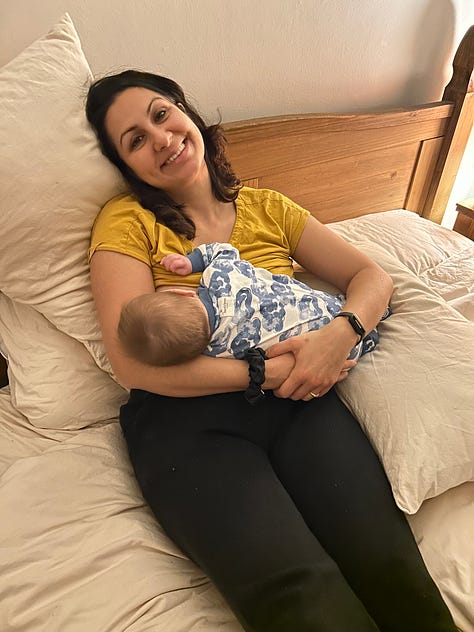
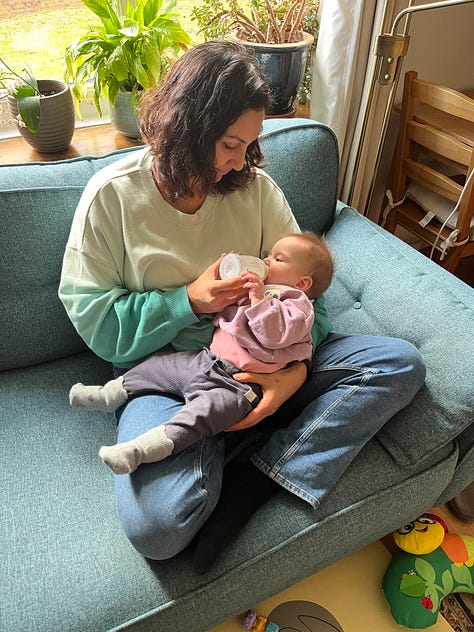
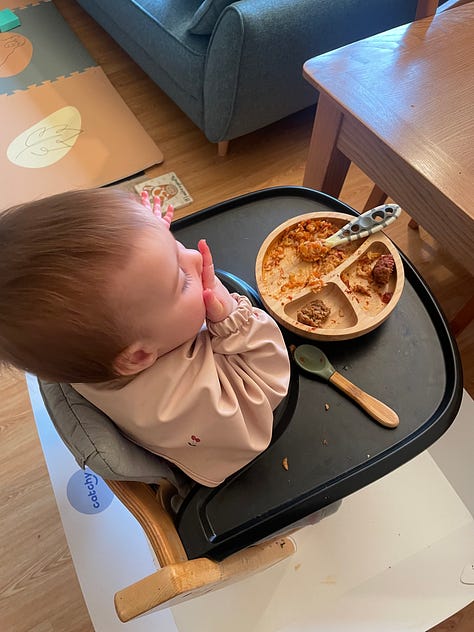
12. It’s OK to be angry.
One of the biggest fallacies of modern motherhood is how society and our culture places it on a pedestal, constantly telling women (not men!) that having a child is the most important and valuable thing they can do and making them feel like a pariah if they don’t have them. But once you have a child, you find your power, capacity, and influence so reduced that you are rendered almost invisible, not to mention how your monumental workload is ignored. I’ve found pregnancy, birth, and motherhood to be one of the most radicalizing experiences I’ve had, as it’s opened me up to experience gender inequality in a way I hadn’t experienced before. “How’s Mum doing today?” health visitors and midwives would chirp happily every time they came to visit. Mum wished she still had a name.
13. Someone once told you (you don’t remember who, you were too tired) that everything, good and bad, is a phase.
You will hold to this when the times are bad but will totally forget when the times are good, so when the sleepless nights/feeding troubles/teething pain hits again, it’ll feel like a sucker punch coming out of nowhere.
14. Baby clothes with zippers are 1,000 times better than those with poppers.
You will wonder why all baby clothes don’t come with zippers. Simple as that.
15. You don’t get a prize for doing everything the hard way.
Take the pain relief, accept all offers of help, give the baby the same breakfast seven days in a row if it means they’ll eat it without fussing, dress them in mismatched clothes—honestly, who cares.
16. Inexplicably, you’ll find yourself thinking about doing it again.
No matter how exhausting it was and how crazy you felt, there’s an addictive quality to the intensity of the experience. The endless rushes of oxytocin that come from a small baby nestled asleep in your arms, the sound of their raspy breathing against your chest, the feel of their plump hands gripping your fingertips, the buttery softness of their skin and the way that their joy is utterly contagious, like a wave of happiness rolling over everything in their path —will probably make you want to do it all again.
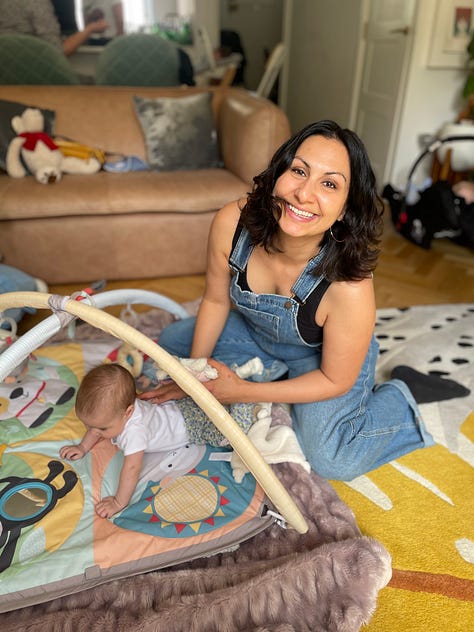


Yasmin xx





Wow this is the first time I’ve ever read an honest piece of writing on new motherhood. This was amazing. Maybe it’s not like this for some people, obviously how can I know, but for me it was exactly like this and I felt like no one wanted to hear about it. I had a helpful spouse, family and friends but still felt completely isolated and alone because it didn’t seem like they really knew how I felt. Specifically, they didn’t seem to want to know how I felt.
Such wisdom and truth here Yasmin. Welcome back to your world, you tell a powerful story of motherhood.